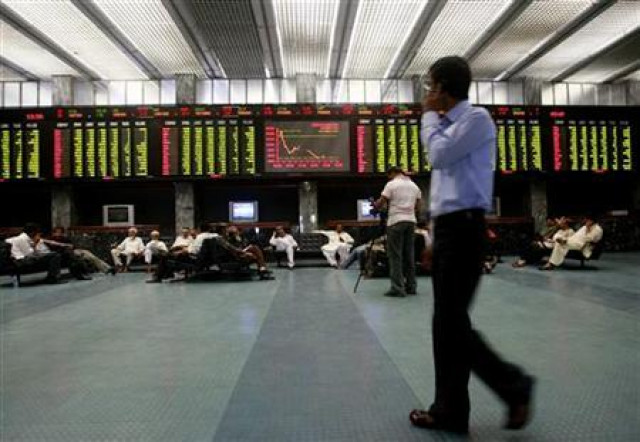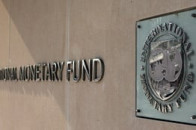Signs of recession in Pakistan’s economy
Business activity has slowed down markedly in FY19

A stockbroker walks near an electronic stock exchange board inside the trading hall at the PSE. PHOTO: REUTERS
The large-scale manufacturing (LSM) index remained negative in the first eight months of the current fiscal year 2018-19. A slowdown in the industrial sector will have spillover effects on the services sector which, in turn, will bring down activities in the wholesale, retail, transport, communications and financial sub-sectors.
A technical definition of recession in developed economies is that when the gross domestic product (GDP) of two consecutive quarters is found to be negative. These countries are resource-rich and have an enormous amount of data, therefore they are able to detect recession in the same financial year. In these countries, governments officially declare a recession based on available statistics. On the contrary, recessions are interpreted differently as far as developing economies are concerned. These countries are not data rich owing to various reasons. The calculation of GDP is done on an annual basis.
Although the Economic Survey of Pakistan will publish statistics of FY19 this year, the revised statistics will be out in May 2020. For instance, the government has determined a revised GDP figure of 5.2% for FY18 and this is a normal practice in our country. In the context of developing economies, paltry growth is called a recession.
There was a marked slowdown seen in the business activity in FY19. This statement could be qualified on the basis of available statistics, observation and anecdotal evidence.
Despite high international oil prices, the petroleum import bill is almost stagnant in the first nine months of FY19. However, there is a quantitative decline in imports of petroleum products and petroleum crude. In addition, there is an element of substitution where imports of LNG have increased to some extent. As a whole, the statistics depict a decline.
A marked slowdown in business is reflected by looking at government’s income ie tax revenue. There was a paltry growth of 3% in the tax revenue when inflation was around 7% in the first nine months of FY19. This shows that the real tax revenue collection is negative.
The decline in real tax revenue depicts that the tax base has narrowed. Businesses are either not performing well or are on the verge of closure or bankruptcy. Under the emerging situation, what would be the response of the government? The easiest thing for the government is to increase taxes on inelastic items. The restoration of mobile taxes would be heartening for the government. Through these taxes, the government would fetch billions in revenue.
The government should consider increasing taxes on petroleum products in the days to come since these are also inelastic in nature. Considering public backlash, the government may pass on the impact in a phased manner. However, it has to resort to these taxes to pump up the revenues.
Whenever petroleum prices are adjusted upwards, there are direct effects on the prices of essential items. Under the emerging situation, it has become quite challenging for the government to give subsidy on petroleum products since it will have a downside.
If the government does not revise up petroleum prices, it's budget deficit will increase in two ways - subsidising the products and leaving the collection of taxes. Hence, revising up the petroleum prices is the eventuality.
In short, government expenditure would increase under the emerging situation. On the other hand, there is a paltry growth expected in tax revenue. The challenge is to pacify the masses under the hard fiscal constraints going to be recommended by the IMF.
The writer is the Assistant Professor of Economics at SDSB, Lahore University of Management Sciences
Published in The Express Tribune, May 6th, 2019.
Like Business on Facebook, follow @TribuneBiz on Twitter to stay informed and join in the conversation.



















COMMENTS
Comments are moderated and generally will be posted if they are on-topic and not abusive.
For more information, please see our Comments FAQ